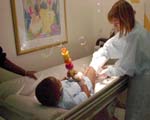|
|

|
Pediatric burn unit helps children recover
|
by Megan Fink
Public Relations
As the only pediatric burn unit in South Carolina, the pediatric burn
team at MUSC Children’s Hospital is dedicated to providing excellent
care for injured children.
The Pediatric Burn Center is a family-centered program run by a
multidisciplinary team composed of pediatric surgeons specializing in
burn care, pediatric intensive care physicians, pediatric emergency
personnel, pediatric burn nurse specialists, physical and occupational
therapists, child life specialists, nutritionists, social workers,
clinical pharmacists, and psychiatrists. The Pediatric Burn Team is
well equipped to address both the physical and psychosocial needs of
burn-injured children and their families.
 Amy
Ferguson, pediatric burn team physical therapist, performs a dressing
change on a patient in the center’s hydrotherapy room. The hydrotherapy
room is used to wash the wounds of recuperating burn patients, which
reduces the chance of infection. Amy
Ferguson, pediatric burn team physical therapist, performs a dressing
change on a patient in the center’s hydrotherapy room. The hydrotherapy
room is used to wash the wounds of recuperating burn patients, which
reduces the chance of infection.
The Pediatric Burn Center sees about 50 inpatients every year with 5
percent of these children needing critical-care treatment. The majority
of the center’s patients, more than 400, are seen in clinics or
for outpatient surgery.
Key differences between a pediatric burn center and an adult center are
the specialties of staff and treatment environment. The Pediatric Burn
Center staff understands that children respond to stressors differently
than adults. “Children often experience nightmares while in the
hospital and may refuse to talk or eat,” said Betsy McMillan, Child
Life specialist. “Children have better outcomes when provided with
age-appropriate preparation for their procedures, therapeutic play
oppor-tunities and emotional support.” Physical and
occupational therapy is often masked through sports or other fun
activities, such as baking cookies and parades through the unit.
The special needs of burn injured children and their families are met
with monies from the Burn Children’s Fund, a collaborative effort
between MUSC Children’s Hospital and South Carolina Firefighters. The
Burn Children’s Fund’s major fundraising endeavor is their recycling
campaigns hosted at local fire stations, while their main sponsored
event is Camp ‘Can’ Do, an annual camp for burn-injured children in
South Carolina and neighboring states.
Most burn-related injuries in children are small, clean contact burns.
Hot liquids are the most common of these contact burns, while injuries
resulting from flames occur in children 10 years and older. “We often
see more patients in the summer when there is less supervision at
home,” said Jill Evans, R.N., pediatric burn services coordinator. “The
home is actually the number one place for all burn injuries in both
children and adults.”
In addition to more burns happening in the home, males are twice as
likely to get burned as females. “Starting as early as age 10, boys
take more risks,” Evans said. “And with South Carolina largely being a
rural state, boys begin performing tasks and chores around their
family’s property without either having the adult supervision or the
experience or mature intuition.” Injuries can occur from tasks, such as
running lawn mowers and burning trash.
For more information on initial burn wound care and the referral
process to the Pediatric Burn Center at MUSC Children’s Hospital,
contact Evans at evanj@musc.edu or 792-3852.
Friday, Aug. 14, 2009
|
|
|



